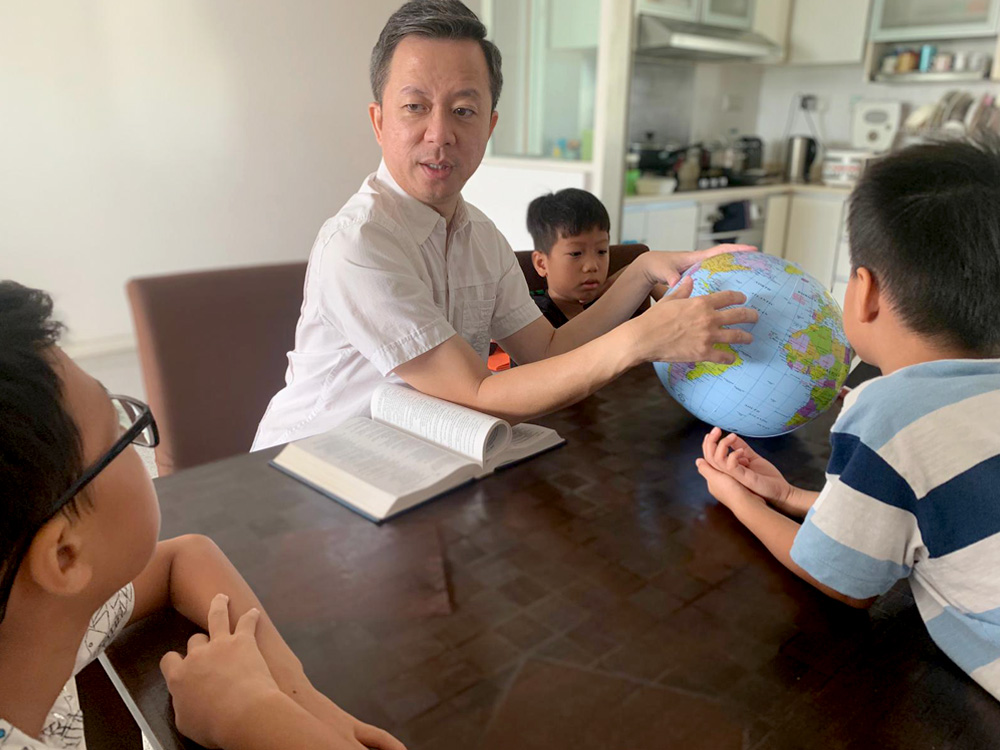
Imagine finding out from your 10-year-old son that his classmate has been watching porn in class. Or being told by your tearful child that his best friend had suddenly rebuffed his friendship.
How would you respond?
Such moments of heartfelt vulnerability prompted Sng Ee Ping to write a series of short stories over the past two years—stories that eventually became It’s Tough to be a Kid, a book published by Discovery House that follows the adventures (and misadventures) of four rambunctious siblings, Max, Phoebe, Stephanie, and Rick.
The inspiration for the book, Ee Ping says, came from her own conversations with her three sons—Elijah, 6, Nate, 8, and Titus, 10—as well as her experiences as a former teacher.
“My first posting was at a neighbourhood secondary school. I handled many cases of children who were unable to manage their emotions; one student threw a chair at a teacher because he was so angry,” recalls Ee Ping. “So I guess I was inspired to pen down these experiences.”
It’s Tough To Be A Kid
Get our latest children’s resource!
It’s Tough To Be A Kid: Walking Together Through Life’s Tricky Moments, is now available.Get a copy
Every month, we roll out a new resource for families. Subscribe to our email updates, and be the first to get a copy!
The 20 short stories in It’s Tough to be a Kid are anchored in real-world themes such as mental wellness, body image, and gaming addiction, which are reflected in the four characters’ conversations and the choices they face. Each chapter closes with a resolution rooted in the wisdom of the book of Proverbs, with guidance and encouragement from the characters’ parents.
One story, which recounts how a character was rebuffed by his classmate, was inspired by the actual situation Ee Ping’s eldest son faced. In fact, it sparked the idea for the entire book.
“Titus is generally a very happy-go-lucky and positive boy, so it was out of the ordinary for him to cry that day,” recalls Ee Ping. “I was taken aback and I felt burdened, because I didn’t feel ready to talk about friendships with him. After comforting him, I wanted to think through what he said, and how I should help him see friendships from a biblical perspective.”
 (From left) Titus, Nate and Elijah
(From left) Titus, Nate and Elijah
Imparting Biblical Values Through Stories
One thing Ee Ping has found helpful is reading stories together with her children. “I started having quiet time with my boys with a story book about the Miller family,” says Ee Ping. “The boys enjoyed it, and they looked forward to the next story.”
This book also hinged on verses from Proverbs, but its stories were set on a rural American farm in the 90s—which, as Ee Ping noted, “lacked a connection to our culture.”
At the same time, her own sons were opening up to her about various incidents at school, from bullying to pornography. This prompted her to reflect on how the book of Proverbs could be relevant to making wise decisions in daily life in Singapore.
“I didn’t really think I would write a book—I just wanted to write down the stories that the boys shared with me,” Ee Ping muses. “Sometimes, I didn’t have an answer to tell them on the spot, ‘Okay, this is what you should do when your friend says this to you.’ So I would pray about it and discuss it with my husband Elmer. And then I’d find the time to talk to my son again.”
“When you read a third person’s narrative, it can trigger conversations like, ‘Yeah, actually, I also have experienced this before.’ And that’s where parents can talk to the child about it.”
That’s where story books came in handy, says Elmer, as they paved the way for such chats. Starting conversations about particular topics or incidents can feel awkward and contrived for both parents and children, he notes.
“Even if it happens to your kid, sometimes, for whatever reason they may be reluctant to talk about what they experienced,” he adds. “But when you read a third person’s narrative, it can trigger conversations like, ‘Yeah, actually, I also have experienced this before.’ And that’s where parents can talk to the child about it . . . sometimes you just need stories to facilitate conversations.”
Treasuring the Ordinary But Precious Moments
After working as a secondary school teacher for 12 years, Ee Ping took a break from full-time work in 2018 to spend more time with her sons, a decision she has never regretted.
She cherishes the moments picking up her sons after school and being the first to hear about their day. “Even though I liked having a full-time job and financial security, I felt that nothing could replace those moments that I could be with him when he needed me most,” she says, recalling the time when Titus confided in her about his struggles with friendship.
While her mother was a stay-at-home mum, Ee Ping had never felt comfortable enough to open up to her parents about her own struggles. “I was a very emotional child who grew up with a low self-esteem,” she recalls. “I was constantly worried about how people viewed me and my results, and I wanted to prove myself to get the approval of others. So when I failed to get that, I would be very depressed.
“We may not know how to react the first time, but as long as we have good, open communication, then we can always have room to talk about it.”
“I never talked about this with my parents . . . so I feel that that was something that I lacked, that I wanted my kids to have.”
These days, the part-time polytechnic lecturer and freelance writer spends her mornings teaching classes, before picking up her kids from school in the afternoon and spending the rest of the day with them.
And it’s in these mundane, ordinary moments that Ee Ping gets a glimpse into her sons’ daily encounters and challenges.
One day, she picked her boys up from school and noticed them whispering to one another in hushed tones. “They said, ‘Mum, it’s a secret, we cannot tell you. It’s very serious.’ They refused to tell me until they came home.”
They later revealed that one of her son’s classmates had been doing something they knew was wrong. “It was something I could draw out from them when they come home, they have lunch, and they are more relaxed,” she says.
Of course, such episodes—and knowing that their kids were in the thick of it all—could not have been easy to swallow. “We have to take time to process it ourselves,” says Elmer. “We may not know how to react the first time, but as long as we have good, open communication, then we can always have room to talk about it.”
 Elmer believes in the value of helping his boys see the connections
Elmer believes in the value of helping his boys see the connections
between God’s Word and what’s happening in the world
Connections, Communication, and Christ
When approaching “taboo” topics, Elmer believes in educating their sons about respect for their own bodies and other people’s bodies. “We have to give them an understanding of the biblical perspective of sex and intimacy,” he says.
At the heart of communicating such truths, he adds, is learning how to parent with God’s wisdom.
“It’s not just trying to help them understand what sex is as an act, but its underlying values and relationships,” says Elmer. For example, he uses the story of Adam and Eve in Genesis 2:20–24 to show that sex is a “sacred gift” that God gives to a man and woman in a marriage relationship—and to counter what their sons’ classmates and modern society might say about it.
“It’s a lot of work to build this conversation that will continue as they discover more things,” he says. “But the important thing is to keep the conversation open and honest, and if that channel of communication is open, we have a place to influence and teach them.”
One way Elmer and Ee Ping try to do this is by striking up conversations when the opportunity arises, such as a kissing scene on television. “It’s about finding teachable moments: seeing what’s going on in the world and connecting it to God’s Word, and helping them understand how the Word bridges to the world around us,” says Elmer.
“We don’t just talk about the gospel—they also have to see us putting it into action. When we talk to them about loving people, we start loving people first.”
At the end of the day, both parents stress that it’s not only about imparting faith through words, but also exemplifying faith through deeds. “Even though they’re born in a Christian family, we never assume that they are Christians. It’s not as simple as, ‘Oh, my child prayed to receive Christ’. It’s looking for signs of genuine faith,” says Elmer. “We have to be intentional in sharing what faith really looks like.”
Before Covid-19, the family used to invite home kids from the neighbourhood, of all ethnicities and backgrounds. Their sons were also involved in their church’s outreach reading programme for kids living in the vicinity.
“We don’t just talk about the gospel—they also have to see us putting it into action. When we talk to them about loving people, we start loving people first,” says Ee Ping. “So we try to be deliberate and intentional about being hospitable.”
This aspect of their life surfaces in a number of chapters in It’s Tough to Be a Kid, in which the characters prepare, pack, and distribute Christmas presents to less well-to-do families. It’s an annual tradition for Ee Ping’s family—which generates its fair share of reluctance from the children, as with the kids in the book.
“Sometimes they’d rather do their own things, and they ask me why they have to do this,” says Ee Ping. “We always say that we want to show God’s love.”
 Ee Ping and her three sons have daily quiet time, with the help of picture books
Ee Ping and her three sons have daily quiet time, with the help of picture books
Helping Families Start Conversations
So far, Ee Ping has been heartened by feedback from parents and children who have read early versions of her book. “Some parents shared that they used it as quiet time material with their kids,” she says. “One mum shared that it helped her daughter to open up on a sensitive topic on comparing appearances. So I think that really encouraged me.”
“Sometimes, children can be silent on tough issues like mental wellness or bullying because they’re ashamed or fearful, or because their parents are too busy or find it difficult to talk about these issues.”
She hopes that the adventures of Max, Phoebe, Stephanie, and Rick will spark conversations that lead to precious and teachable moments, which would hopefully be imprinted in young hearts and minds for years to come.
“Sometimes, children can be silent on tough issues like mental wellness or bullying because they’re ashamed or fearful, or because their parents are too busy or find it difficult to talk about these issues,” says Ee Ping. “So I hope this book can be a platform that will open up that conversation.”




